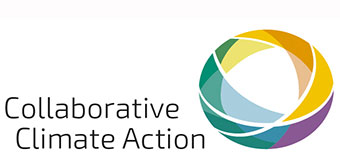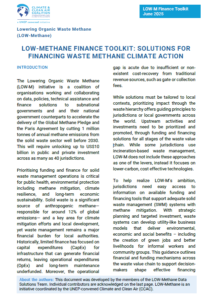LOW-Methane Finance Toolkit
Practical Financial Solutions for Waste Methane Mitigation
The LOW-Methane Finance Toolkit provides local governments and stakeholders with clear, practical guidance to access and mobilise funding for waste methane mitigation. It catalogues a wide range of financing instruments, including grants, concessional and commercial loans, green bonds, equity, and local budget solutions, matched to different stages of the waste value chain. The toolkit also highlights real-world case studies and strategies to overcome common barriers, helping cities and regions identify the most suitable financial pathways for their projects. By improving financial literacy and linking methane mitigation to social and economic co-benefits, the toolkit aims to accelerate investment in waste solutions and support jurisdictions in meeting their Global Methane Pledge commitments.
Key Facts:
- Offers a catalogue of funding and financing options for waste methane reduction projects.
- Matches financial instruments to upstream, midstream, and downstream waste solutions.
- Includes practical case studies and guidance for building strong, bankable project pipelines.
- Helps local governments connect methane mitigation with climate, health, and economic benefits.
“Delivering meaningful methane reductions from solid waste requires more than technical solutions – it demands financing approaches grounded in the realities of local governments.”
The LOW-M Initiative
The The Lowering Organic Waste Methane (LOW-M) Initiative works with subnational jurisdictions to develop tailored portfolios that set ambitious waste methane reduction targets, map existing initiatives, and identify priority actions and capacity gaps in line with the Global Methane Pledge. These portfolios provide partners with a strategic overview of high-impact opportunities, outlining political, technical, and financial needs, and supporting the mobilisation of resources to accelerate methane mitigation efforts.
The following organisations participated at the launch of LOW-M at COP28 and definition of LOW-M’s goals:
Bloomberg Philanthropies, C40 Cities, Canada, Carbon Mapper, Catalytic Finance Foundation, Center for Global Sustainability at the University of Maryland, Clean Air Task Force, the European Union, GAIA, GHGSat, the Global Covenant of Mayors for Climate and Energy (GCoM), the Global Methane Hub, the Global Methane Initiative, Google, the Inter-American Development Bank, the International Solid Waste Association, Pacific Northwest National Laboratory, RMI, SRON, the Under2 Coalition, UNEP-convened Climate and Clean Air Coalition (CCAC), UNEP’s International Methane Emissions Observatory, the United States, the World Bank, and the World Resources Institute.
Since COP28, these organisations have also joined LOW-M’s collaboration efforts:
African Development Bank, Climate Policy Institute, Delterra, European Bank for Reconstruction and Development, Global Food Banking Network, International Finance Corporation (IFC), International Methane Emissions Observatory, ReFED and WRAP.


